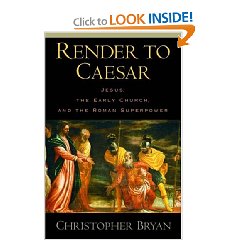Christopher Bryan, Render to Caesar, (Oxford: O.U. Press, 2005),
pp. viii+ 185, $35.00.
I must
confess from the outset that I have a particular inclination to like
Christopher Bryan’s recent book, as he is a man after my own heart (and sharing
a similar education and profession). He
analyzes the NT with the wealth of knowledge he has gained from training not
only in the NT but in Greco-Roman classics, rhetoric, and early Judaism. The result is a full orbed way of reading the
NT in light of all its major influences and confluences. Having read his previous major studies on
Mark and Romans, one is thus quite naturally expecting a good and helpful read
when it comes to Render to Caesar, and Bryan does not disappoint. He is eloquent, he
is on target, he is persuasive, and he exhibits, as my namesake Ben Jonson once
said that ‘chief virtues of a style—perspicuity’. This book may be slender but its force and
ideas are not slight and they are expressed clearly and convincingly. I would rate this as one of the ten best
books written about the NT in the last ten years. Taking it in is rather like eating very rich
food— you need to take small bites at a time, chew thoroughly and then
swallow. The fact that some will find some of it, or much of it hard to
swallow, does not in any way detract from the merit and the power of this
little book.
Sometimes
it is good to know from the outset who the primary dialogue partners or
antagonists are when an author sets out to proof a thesis, and in this case the
authors being most critiqued in this study would be Richard Horsley, Dom
Crossan, Warren Carter, (asnd more recently Neil Elliott) and in general those
who subscribe to the ‘imperial domination system theory’ when it comes to the
Roman Empire and the imperial cult theory when it comes to Roman worship. In other words, it is critiquing the notion
that the Roman Empire is simply painted in
black colors in the NT as inherently an evil empire and that lurking beneath
the surface of much of the NT is a critique of the imperial cult. Bryan
does think there is some critique of the imperial cult in the NT, though not
nearly so much as some of these scholars suggest, but he does not think that the NT is arguing
a case to replace one form of government with another, one set of political
structures with another. Bryan
does not think either Jesus or the NT writers attempt to make such a case, not
even the author of Revelation per se.
But let us hear Bryan’s
own statement of his thesis, in this case speaking about Jesus himself
In sum, there is nothing in the narratives
of Jesus’ ministry that sets him apart from the general theology of empire that
was adumbrated by the traditions of Nathan, Jeremiah, Daniel, Deutero-Isaiah,
and Ezra and that is characteristic of the biblical tradition. The tradition of
his words and works in general do not indicate the slightest interest in
changing the forms or structures of temporal power, in replacing one system of
government with another, or in questions as to whether those who ruled were
believed to be believers or pagans.
Those same traditions do, however, indicate a concern that those who have power
understand it as God’s gift to them, given for the sake of God’s people and the
world. This is the attitude that Jesus consistently maintains on every occasion
where he is seen dealing with those who have temporal authority. (p. 50).
Mutatis
mutandis, Bryan
will argue that the NT writers themselves do not take a more radical view that
their Lord. The words of the Johannine
Jesus to Pilate say it all–“you would have no power over me, if it had not been
given to you.” This is not different
from what Paul says in Rom. 13. The
biblical tradition then, as viewed by Bryan,
is not in the main concerned with the forms nor the origins of human power
structures per se. It is not even particularly concerned with whether a
believer is in office or not. “The
biblical tradition is concerned, however with the purposes for which power structures
are ordained, and it is concerned that those in power should fulfill these
purposes. Thus the biblical tradition subverts human order not by attempting to
dismantle it or replace it with other structures but by consistently
confronting its representatives with the truth about its origin and purpose.
Its origin is that God wills it, and its purpose is to serve the glory of God
by promoting God’s peace and God’s justice for all. Powers and superpowers are
allowed to exist, and may even be approved [think of Cyrus the Persian, called
‘my anointed one’ in Isaiah], but they are always on notice. Biblical tradition
is therefore utterly opposed to the absolutizing of governmental authority
(Dan. 3.4-6!) or to the exercise of that authority without concern for those
who are subject.” (p. 125).
It can be
added that Bryan stresses as well that the Bible is absolutely opposed to
idolatry as well in governmental form or as perpetrated and imposed by a
government which is why there certainly is a critique of pagan power including
the imperial cult in the NT. But the
critique is not laid at the door of ’empire’ per se, it is laid at the door of
idolatry, including the misuse of governmental power for pagan religious
purposes. The problem with Babylon in Revelation is not that it is Babylon or even that it is Empire–the problem
is it promotes idolatry and immorality and as such abuses legitimate governing
power.
Bryan’s critique of the
‘inherently evil empire’ theory cuts several ways of course. On the one hand, it gives no solace to
Marxist analysis of the NT and its attempt to paint Jesus and/or some of his
followers as early examples of Che Guevara, in other words as revolutionaries
or rebels with a cause. On the other hand, his critique suggests that kings and
kingdoms are not inherently bad ideas or illegitimate forms of government, and
so the NT does not provide a basis for the supposition that democracy is what
Jesus really meant when he said the Kingdom
of God is at hand. Freedom in Christ is not equated with
democracy in political structure or in the governmental constitution. This is of course why Paul, who is the big
advocate for freedom in Christ in the NT, is also perfectly comfortable with
suggesting, perhaps drawing on Jesus’ render unto Caesar teaching, that
Christians should be good citizens and show honor and respect to governing
officials, and pay their taxes as well.
1 Peter says much the same, also probably drawing on the precedent in
early Jewish and Jesus’ teaching. The
line of honor is drawn at the point where idolatry and immorality are expected
or required.
Having set
out Bryan’s
major thesis, it will be useful to share some of his supporting conclusions
along the way. One of the things that is so evident throughout this book is the
even-handedness of the treatment of the Biblical evidence. When there is a critique of a ruler or his
practices, then Bryan
says so. When there is commendation,
then he says so. He is not interesting in making out the Bible to support some
modern theory of government of whatever sort. Jesus on the one hand did not
have a problem with paying taxes, nor was he, like Judas the Galilean, an
advocate for revolt against Rome.
The kingdom of which he was the advocate involved direct divine intervention in
human lives, not a voting out or in, or a throwing out or in of this or that
regime. His kingdom was in this world but not of it, but being in this world,
it immediately became the most important kingdom of all, demanding ultimate
allegiance, and when there was conflict with lesser kingdoms, one had to serve
God rather than human governments.
It is thus not responsible to simply demonize the Roman
governmental system per se, and the NT writers do not do so. And as for the death of Jesus Bryan opines—
“the historical probability is that Jesus’ death was brought about not by bad
people or evil systems but by average people— indeed, in the case of the
Sanhedrin, probably better than average–doing the best they could under systems
that were no worse than others in the ancient world, and perhaps rather better
than most….The death of Jesus is no more a symbol of his relationship to the
Roman imperial order than it is a symbol of his relationship to Jews. It is a
symbol of his relationship to the world. And that means, to us.” (p. 64).
In short Bryan sees some Jewish leaders
and Pilate as involved in the death of Jesus without it being a comment writ
large against either early Jewish life or the Sanhedrin or a comment against
the Roman Empire and its jurisprudence. Bryan
utterly rejects the strange notion of Crossan that the earliest Christians knew
little or nothing about the particulars of Jesus’ trial (s) and execution. On
the contrary, the whole tradition found in both Gospels and Paul suggest there
were multiple eyewitnesses amongst Jesus’ followers to the whole process that
led to his death, burial, and resurrection (see. e.g 1 Cor. 15 and Acts 1).
When it
comes to Paul’s presentation of the Gospel, Bryan reminds that Paul operated in
a world where there were gods many and lords many and saviors aplenty (see 1 Cor. 8) and it
simply was not inherently treasonous to suggest Jesus was one of them. The facile claim that saying Jesus is Lord necessarily
implied (and you, the Emperor, are not) is too easy a claim. He puts the matter thusly: “Such a view of
emperor worship treats it, I suspect, far too much as if it were a phenomenon
like Christianity. Greco-Roman religion (from which emperor worship should not
be separated) did not, essentially, involve a body of doctrine and belief as does
Christianity, but rather was a practice of honoring the gods….The fact is, even
at the height of the persecutions, Rome’s problem with Christianity appear
generally to have nothing to do with what Christians believed or claimed about
Jesus and everything to do with Christians’ refusal to honor the Roman gods.” (pp.
91-92). Whilst I think this conclusion
is basically right, I think it is somewhat overstated, not least because the
only two historical first century persons about whom such divine claims were
being made throughout the empire and over a considerable period of time was the
Emperor and the Christ. While imperial theology may not have produced textbooks
or sacred scriptures its rhetoric and propaganda was plastered all over the
empire. So here, I think Bryan over-eggs the
pudding as the Brits would say. It does
seem clear that Paul, and the author of Revelation and perhaps others were claimed
that Jesus is truly the human divine one, and the Emperor, despite claims to
the contrary is not. The critique of the
imperial cult, with or without developed imperial theology is present in the NT
precisely because it is seen as an inherent manifestation of idolatry. While
Greco-Roman religion was mainly about praxis and ritual, it had its theological
elements, especially when it came to the Emperor cult. Julius Caesar would not have raised the same
concerns as Domitian precisely because of the different nature of the claims
being made about each.
There is so
much more to Bryan’s
panegyric but I will leave you to find out about it on your own. Suffice it to say that this book has all the
earmarks of a truly good theological book— it teases the mind into active
thought and forces you to rethink your previous paradigms and conclusions.
BW3


